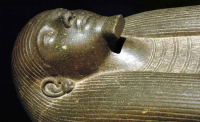Chapter 3
by Shya Scanlon
Forecast was serialized semiweekly across 42 web sites. For a full list of participants and links to live chapters, please visit Forecast 42 for more info.
—
Jennifer Allen and Marshal Karuth met on the “long walk” to Seattle from parts south before the Electrical Revolution swept everyone back off their feet with the power of disgust and betrayal built up from years of forced recognition that any and all things would inevitably disappear. But the real revolution for this pair was not, and had never been, the long slow sweep of time, drawn out as by a snake charmer from the hole of hidden histories. Their battle, individually and then together, having found each other along the way, fallen in together then for each other, was more personal if no more precise. Like so many people around them who, from Jen and Marshal’s perspective, had let things go so far astray, had simply let things go, they accused themselves of a fundamental acquiescence of spirit, a surrender in the face of life’s Great Challenges, one of which, they’d say, was the challenge to spread about evenly the precious resources that let them live, that allowed for the easier eases of everyday life.
Many people made this passage: dreamers, poets, entrepreneurs, sleepwalkers and thieves. They walked through the soft industrial wastelands littered with antiquated technologies and they walked over the undensed forests withered by the nearing sun. Many found their way along the way, turning from the path to forge new direction and settle new land. Jennifer’s hand met Marshal’s one night in the thinning crowds on dish duty, their trembling soapy fingers forgetting themselves and forging new direction into one another’s hearts. Jennifer’s overlarge eyes, part of Helen’s inheritance, barely covered their lids in her quick consideration of the vexed intentions of her solo sojourn, and Marshal’s arms, unburdened by muscle, unmasked a barely visible flex. They were in love.
They came from wealthy families; neither had been driven north by financial crisis, nor by the law. They had not gone from necessity and, from some points of view, were apocalyptic tourists, set on seeing how the majority lived, what made them tick, acquiring a taste for the misery around them. But they distinguished themselves from this sadomasochistic minority, if not visibly, by having different objectives altogether. Their interest in the trek northward to one of the few cities where things had not completely fallen apart, was not to “see”, but to “do”. They wanted to live free of the fears of their families, the fears that kept hearts closed and houses locked and people employed to roam the perimeter; “free from the sins of our fathers,” as Marshal had put it one evening, Jennifer allowing herself some small delight that they could have come so far and yet feel still so similar to all those that had come before.
As they nestled into the Nisqually basin, just south of their destination, the expedition set up camp a final time, and Jennifer and Marshal, off kitchen duty, retired early to their tent to celebrate the conclusion of their first, and what would arguably be their last, true adventure. Nine months later Zara was born.
Upon arrival, her parents picked an authentically dispossessed part of town to raise their love child, and Zara spent her childhood close to home. She grew up on an analogue oasis dreamt by the digital depression around it – Seattle’s tech-driven economy, tech-inspired dress code, and tech-insulated ethical mainframe having been savaged by the end of electricity, drawing out the tree-hugger lying dormant beneath all the zippers and snaps, until people felt more comfortable with the Nature Has Won TM campaign used by the government to assuage the sense of loss with an image of new beginnings and spirited environmentalism, a Green card to some new universal citizenship. And if submission to the dominance of natural structures was the aim of this rather abrupt social cultivation, Zara was a model member. The prey-or-be-preyed-on mentality, though not explicitly endorsed by the powers of PR, was enacted in her quite “naturally”. Or so it seemed. She ran amuck among her peers and her peers’ parents, in and out of houses, yards, beds and backpacks, a true urban gypsy. The neighborhood kids called her The Zarabarbarian.
When she finally cared enough to ask, her mother explained to Zara that her name had its origin in a book by a fellow Zara, even after internalizing its correct pronunciation, would continue to pronounce Nee-chee, like a bastardization of the first two characters of the Japanese number system: Ichi, Ni. Nietzsche gave her itchy knees, she’d say. This less than clever wordplay upset her parents until they learned to comfort themselves with the possibility of its sexual connotation, exploding the childish phrase beyond its adolescence and into the grainy grotesque of early adulthood – short skirts, flirtatiousness, and the warped pussy-power relationships at which Zara, they knew – had made certain from very early on – would excel. ”Yes, Zara, he gives me itchy knees too!” Jennifer would encourage in a completely non-condescending manner, thereby just as completely robbing her daughter – a pattern that would eventually drive Zara right out of the house, their lives, and eventually her own name – of her attempted rebellion.
Of the countless books she devoured from an early but untender age, Zara completely avoided Nietzsche’s work. She steered clear of anything, in fact, that may have shed some light on why her parents would make such a selection. It was her only point of control, she’d explain to unsuspecting adults, charmed by this precocious leather-clad lust-bomb. Her ignorance was the only thing she owned.
This, I submit, was true. Zara Karuth was, throughout her stay with Jennifer and Marshal, a stunning example of everything they were not. She was a hellion. They’d consulted all the best doctors. It was true. Zara displayed every behavior her parents had instilled – willful disobedience, pride and self-satisfaction, arrogance, opulence, effervescence, and a dark distrust for everything around her. She would not, clear as clear, fall prey to the mechanized motions of social order that had claimed the hearts and heads of everyone in her parents’ generation, everyone who lifted not a finger in the final days of short-order daylight, dishwashers and hairdryers and whatever else responsible for the comfortable buzz-hum that hovered always in the back of your head. Jennifer and Marshal had been weak. Zara would be strong.
This strength, however, was, on the first day of 10th grade, returning to the inane and inarticulate clutches of Mr. Handpepper, eclipsed by a very rare incapacity on Zara’s part. Classmates long intimidated by her radical remarks and irreligious attire would, from this day forward, not feel so threatened, and assuming no unexpected alleyway altercations occurred, feel that the tables had been irrevocably turned. This too was true. At least, it was as true as Jennifer and Marshal’s proclamation of their daughter’s power in the first place, which is to say, a bull’s eye made by the blind.
Northville Review has Chapter 2
Chapter 4 is now available at John Madera’s blog.
Flatmancrooked will be publishing Forecast in 2010.









